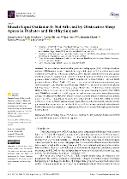Muscle Lipid Oxidation Is Not Affected by Obstructive Sleep Apnea in Diabetes and Healthy Subjects

Autor
Lattová, Zuzana
Slováková, Lucie
Plíhalová, Andrea
Datum vydání
2023Publikováno v
International Journal of Molecular SciencesRočník / Číslo vydání
24 (6)ISBN / ISSN
ISSN: 1661-6596Informace o financování
MZ0/NU/NU21-01-00259
MSM//LX22NPO5104
UK/COOP/COOP
Metadata
Zobrazit celý záznamKolekce
Tato publikace má vydavatelskou verzi s DOI 10.3390/ijms24065308
Abstrakt
The molecular mechanisms linking obstructive sleep apnea (OSA) with type 2 diabetes mellitus (T2DM) remain unclear. This study investigated the effect of OSA on skeletal muscle lipid oxidation in nondiabetic controls and in type 2 diabetes (T2DM) patients. Forty-four participants matched for age and adiposity were enrolled: nondiabetic controls (control, n = 14), nondiabetic patients with severe OSA (OSA, n = 9), T2DM patients with no OSA (T2DM, n = 10), and T2DM patients with severe OSA (T2DM + OSA, n = 11). A skeletal muscle biopsy was performed; gene and protein expressions were determined and lipid oxidation was analyzed. An intravenous glucose tolerance test was performed to investigate glucose homeostasis. No differences in lipid oxidation (178.2 +- 57.1, 161.7 +- 22.4, 169.3 +- 50.9, and 140.0 +- 24.1 pmol/min/mg for control, OSA, T2DM, and T2DM+OSA, respectively; p > 0.05) or gene and protein expressions were observed between the groups. The disposition index, acute insulin response to glucose, insulin resistance, plasma insulin, glucose, and HBA(1)C progressively worsened in the following order: control, OSA, T2DM, and T2DM + OSA (p for trend <0.05). No association was observed between the muscle lipid oxidation and the glucose metabolism variables. We conclude that severe OSA is not associated with reduced muscle lipid oxidation and that metabolic derangements in OSA are not mediated through impaired muscle lipid oxidation.
Klíčová slova
obstructive sleep apnea, type 2 diabetes mellitus, free fatty acids, lipid utilization, IVGTT, glucose intolerance, muscle metabolism, hypoxia,
Trvalý odkaz
https://hdl.handle.net/20.500.14178/2150Licence
Licence pro užití plného textu výsledku: Creative Commons Uveďte původ 4.0 International







